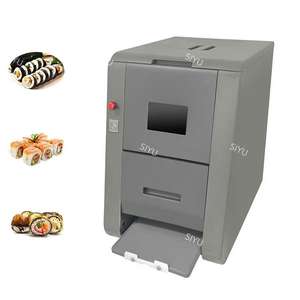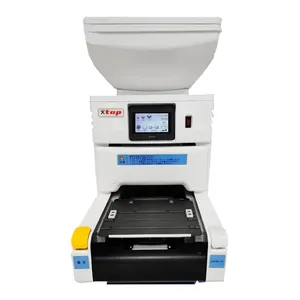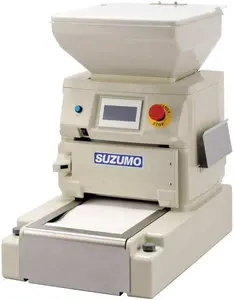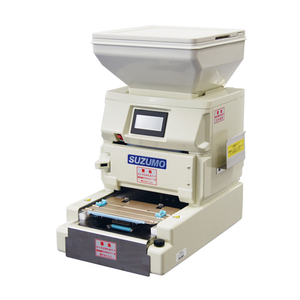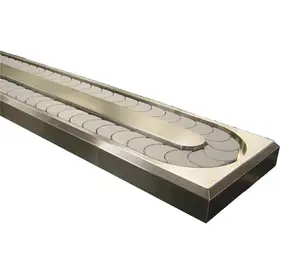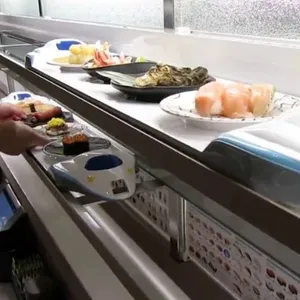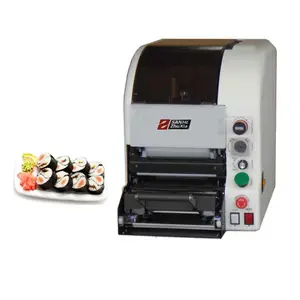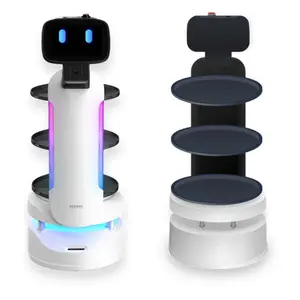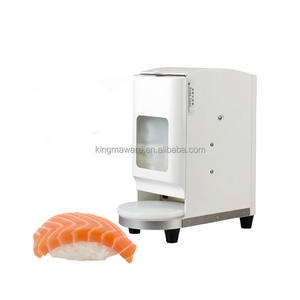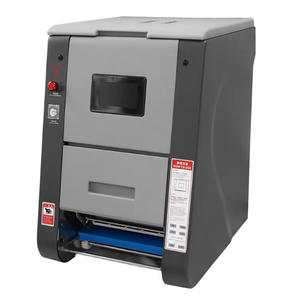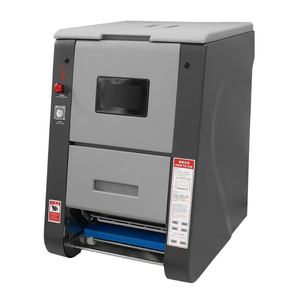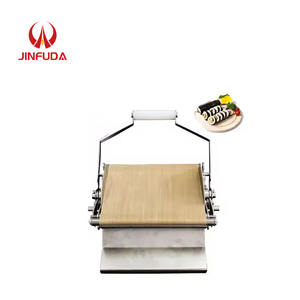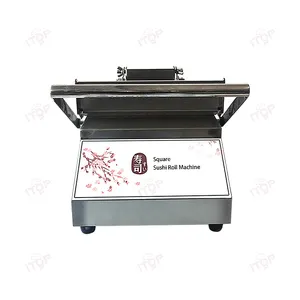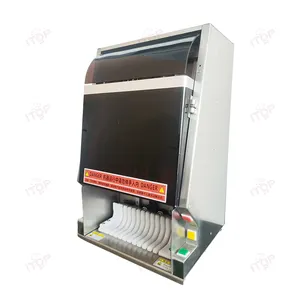Sushi Robot








 1/9
1/9




 1/11
1/11








 1/8
1/8



 1/18
1/18





 1/21
1/21




 1/16
1/16



 1/13
1/13



 1/2
1/2





 1/8
1/8



 1/12
1/12





 1/18
1/18
About sushi robot
Where to Find Sushi Robot Suppliers?
China leads global production of sushi robotics, with key manufacturing clusters in Guangdong, Henan, and Hunan provinces. These regions host vertically integrated supply chains combining precision engineering, food-grade material sourcing, and automated assembly lines. Guangzhou and Ningbo serve as primary export hubs due to proximity to major ports, enabling efficient containerized shipping to North America, Europe, and Southeast Asia. The concentration of specialized machinery OEMs allows for rapid prototyping and scalable production runs, supporting both commercial kitchen equipment brands and private-label distributors.
Suppliers leverage localized ecosystems where CNC machining, stainless steel fabrication, and control system integration occur within 50km radii. This reduces component lead times by 25–40% compared to offshore alternatives. Industrial zones in Zhengzhou and Changsha focus on heavy-duty automatic systems, while Ningbo-based manufacturers specialize in compact, consumer-grade sushi-making tools. Buyers benefit from flexible MOQs, ranging from single sets for testing to container-load orders, with average production capacity reaching 300–500 units per month per facility.
How to Choose Sushi Robot Suppliers?
Procurement decisions should be guided by technical validation, operational reliability, and transactional safeguards:
Technical Compliance & Food Safety Standards
Verify adherence to international food safety regulations including FDA compliance for materials in contact with food. Equipment must utilize 304 or 316-grade stainless steel for hygienic surfaces. CE certification is essential for European market entry, ensuring electrical safety and electromagnetic compatibility. Request documentation for motor efficiency ratings, temperature resistance, and waterproofing (IP ratings) where applicable.
Production Capability Assessment
Evaluate supplier infrastructure based on the following criteria:
- Minimum factory area of 2,000m² for dedicated food machinery production
- In-house R&D teams capable of customizing rice compression pressure, portion size, and cycle speed
- Integrated CNC and welding capabilities to ensure mechanical precision
Cross-reference on-time delivery rates (>98% ideal) with response time metrics (≤2 hours preferred) to assess operational responsiveness.
Transaction Risk Mitigation
Utilize secure payment mechanisms such as escrow services that release funds only after equipment verification. Prioritize suppliers with verifiable export histories and third-party trade assurance records. Conduct pre-shipment inspections via video audit or third-party QC firms to validate build quality, especially for fully automatic models involving servo motors and programmable logic controllers (PLCs).
What Are the Best Sushi Robot Suppliers?
| Company Name | Location | Main Products | Online Revenue | On-Time Delivery | Avg. Response | Reorder Rate | Customization |
|---|---|---|---|---|---|---|---|
| Zhengzhou Aslan Machinery Co., Ltd. | Henan, CN | Grain Product Making Machines, Packaging Systems | US $10,000+ | 83% | ≤7h | <15% | No |
| Ningbo Kmanlu Technology Co., Ltd. | Zhejiang, CN | Sushi Tools, Kitchen Accessories | US $20,000+ | 100% | ≤2h | 30% | No |
| Changsha Lvzhoushu Technology Co., Ltd. | Hunan, CN | Food Processing Machinery, Filling Systems | US $60,000+ | 100% | ≤2h | 26% | No |
| Guangzhou Shengtuo Food Machinery Co., Ltd. | Guangdong, CN | Sushi Spreaders, Nigiri Makers, Meat Slicers | US $100,000+ | 100% | ≤1h | <15% | No |
| Luohe Siyu Machinery Co., Ltd. | Henan, CN | Commercial Sushi Robots, Maki Machines | US $710,000+ | 98% | ≤2h | 18% | Yes |
Performance Analysis
Luohe Siyu Machinery stands out as a custom manufacturer with high transaction volume and customization support across color, size, logo, and packaging—critical for branded deployments. Despite a slightly lower reorder rate, its 98% on-time delivery and sub-2-hour response time indicate strong operational discipline. Guangzhou Shengtuo leads in revenue output and responsiveness (≤1h), reflecting robust customer service infrastructure. Ningbo Kmanlu and Changsha Lvzhoushu achieve perfect on-time delivery records, suggesting reliable production planning. However, lower reorder rates among several suppliers may reflect competitive markets rather than service deficiencies. For full automation systems, prioritize suppliers offering PLC-controlled machines with documented performance benchmarks.
FAQs
How to verify sushi robot supplier reliability?
Cross-check ISO 9001 certification status and request evidence of internal quality control processes. Analyze supplier tags for consistent on-time delivery (>98%), fast response times (≤2h), and repeat buyer activity. Review product specifications for use of food-safe materials and protection against moisture ingress in kitchen environments.
What is the typical sampling timeline for sushi robots?
Standard models require 7–14 days for sample production. Customized units with adjusted mold sizes or voltage configurations take 20–30 days. Air freight adds 5–10 days for international delivery. Some suppliers offer sample discounts redeemable against bulk orders.
Can sushi robot suppliers ship globally?
Yes, most established manufacturers handle international logistics under FOB, CIF, or DDP terms. Confirm compatibility with local power standards (110V/220V, 50Hz/60Hz) and obtain customs documentation, including packing lists, commercial invoices, and certificates of origin. Sea freight is optimal for full-container loads of large equipment.
Do suppliers accept customization requests?
Limited suppliers offer customization. Luohe Siyu Machinery explicitly supports modifications in color, material, size, branding, and packaging. For other vendors, confirm design flexibility before ordering. Custom tooling may incur additional NRE (non-recurring engineering) fees and extended lead times.
What are common MOQ and pricing structures?
MOQ varies significantly: industrial sushi robots typically require 1 set (priced $1,195–$12,900), while handheld tools have higher piece counts (e.g., 500–1,000 units at $3.60–$10). Desktop commercial units often list MOQs in dozens. Negotiate tiered pricing for multi-unit purchases and consider consolidating orders to reduce per-unit shipping costs.


























